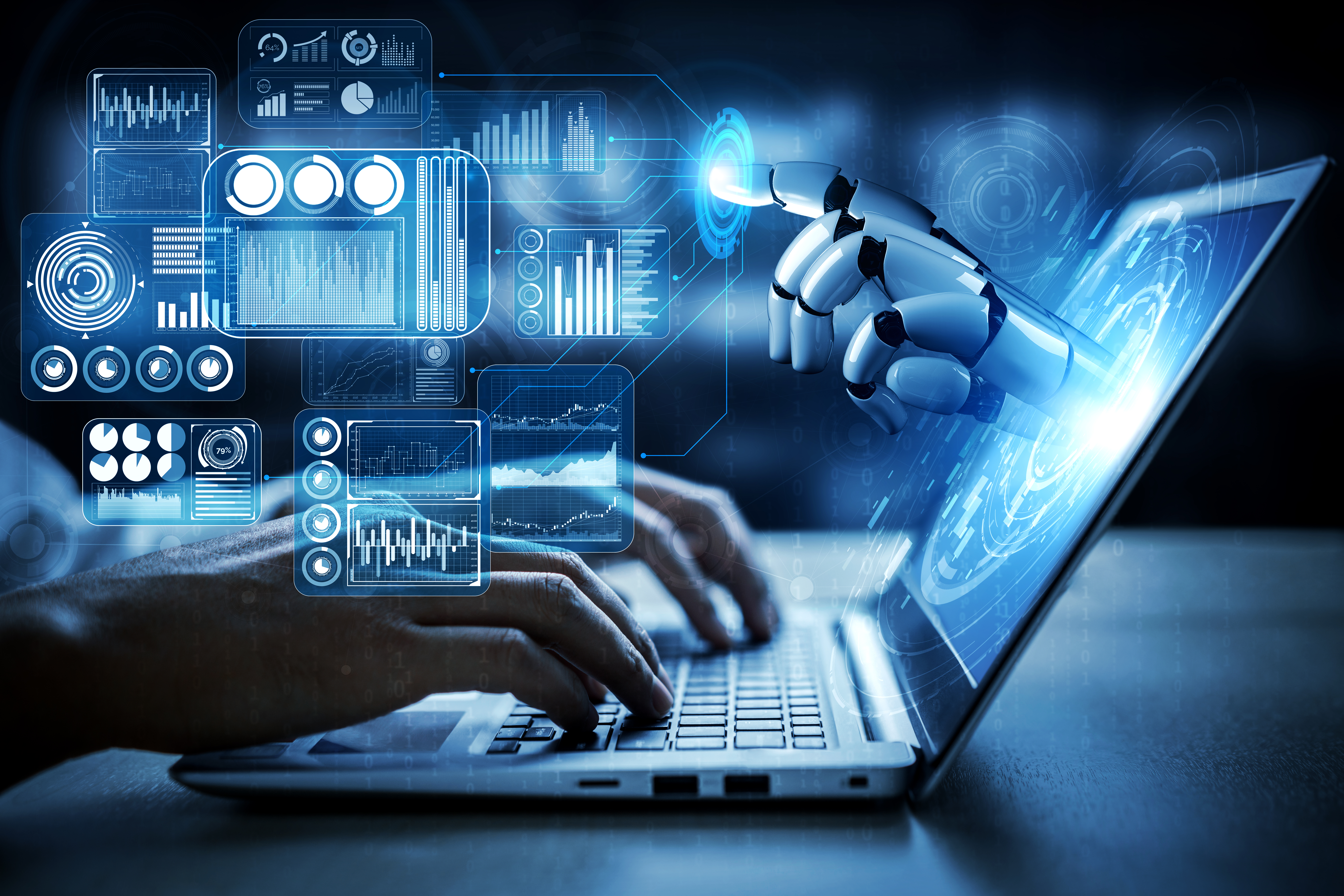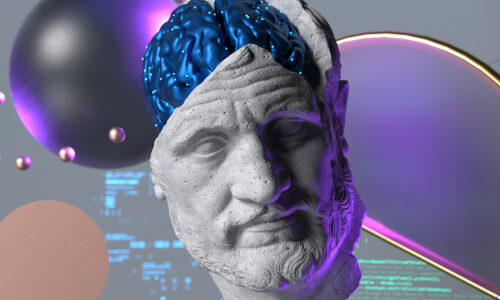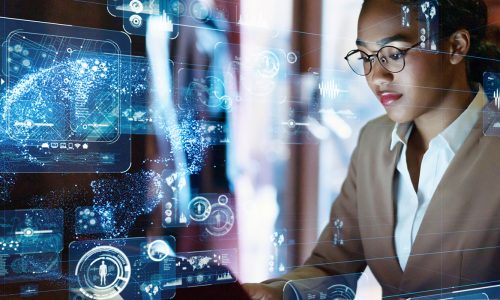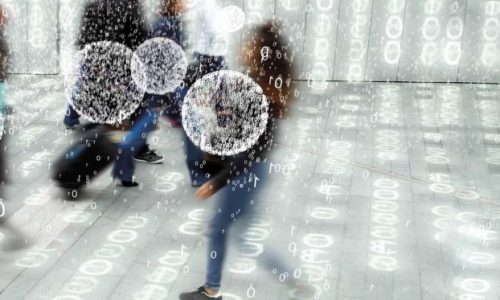L’ensemble des contenus Business Digest est exclusivement réservé à nos abonnés.
Nous vous remercions de ne pas les partager.

“Humans are slow, sloppy and highly intuitive. Computers are exceptionally fast, very rigorous and compete schmucks”. Gérard Berry, professor at the Collège de France
There has never been a robot boss
True
False
Right !
Here is proof that robots will replace us in the office one day: “On 13 May 2014, the Hong Kong-based firm Deep Knowledge Adventures, DKV, appointed an algorithm to its board of directors. The software, known as Vital, will take its seat alongside suited, living and breathing beings who will surely have degrees from the most prestigious universities. DKV specializes in venture capital investments, and invests in private and public companies operating in the fields of cancer research, and regenerative and personalized medicine. The algorithm’s task will be to analyze projected results, preliminary drug tests, patent availability, and the previous fundraising of companies that DKV is considering investing in. As the sixth member of the board, the software will take part in the company’s decision-making and will recommend or screen out excessively risky investments.”
Source: Huffington Post
Source: Huffington Post
Wrong !
Here is proof that robots will replace us in the office one day: “On 13 May 2014, the Hong Kong-based firm Deep Knowledge Adventures, DKV, appointed an algorithm to its board of directors. The software, known as Vital, will take its seat alongside suited, living and breathing beings who will surely have degrees from the most prestigious universities. DKV specializes in venture capital investments, and invests in private and public companies operating in the fields of cancer research, and regenerative and personalized medicine. The algorithm’s task will be to analyze projected results, preliminary drug tests, patent availability, and the previous fundraising of companies that DKV is considering investing in. As the sixth member of the board, the software will take part in the company’s decision-making and will recommend or screen out excessively risky investments.”
Source: Huffington Post
Source: Huffington Post
A robot has already beaten a human at chess
True
False
Right !
Artificial intelligence could match human intelligence by 2029, suggests Ray Kurzweil, a futurologist and specialist in transhumanism and technological singularity. In his 2005 book The Singularity is Near: When Humans Transcend Biology, Kurzweil predicted that machines would be smarter than humans by 2029. He added that by 2045, “Computers will be billions of times more powerful than unaided human intelligence.” Although a highly controversial figure for many years, the researcher nevertheless predicted in 1990 that a computer would beat a human at chess by 1998. And this is exactly what happened in 1997 when IBM’s Deep Blue robot prevailed over the world champion, Garry Kasparov. Kurzweil also even predicted the rise of the World Wide Web (at a time when it was only being used by a handful of academics) and cyber drivers.
Source: HITEK.fr
Source: HITEK.fr
Wrong !
Artificial intelligence could match human intelligence by 2029, suggests Ray Kurzweil, a futurologist and specialist in transhumanism and technological singularity. In his 2005 book The Singularity is Near: When Humans Transcend Biology, Kurzweil predicted that machines would be smarter than humans by 2029. He added that by 2045, “Computers will be billions of times more powerful than unaided human intelligence.” Although a highly controversial figure for many years, the researcher nevertheless predicted in 1990 that a computer would beat a human at chess by 1998. And this is exactly what happened in 1997 when IBM’s Deep Blue robot prevailed over the world champion, Garry Kasparov. Kurzweil also even predicted the rise of the World Wide Web (at a time when it was only being used by a handful of academics) and cyber drivers.
Source: HITEK.fr
Source: HITEK.fr
In the future, robots will understand humans better than humans understand each other
True
False
Right !
And why not? At any event, some people certainly think so! Although Ray Kurzweil (see question 2) says that his estimates have not changed, scientific consensus on artificial intelligence has changed and is now much closer to Kurzweil’s view. As a result, Google decided to hire him in late 2012 as director of engineering so that he could continue to work with the help of Google’s resources.
In fact, Google has recently bought a number of robotic companies, such as Boston Dynamics and Schaft, which will help it to devise a search engine that knows humans better than humans know themselves. “We want computers to read everything that is on the internet, followed by every page of every book, so that they can then engage in intelligent conversation with users and answer their questions.”
Source: HITEK.fr
In fact, Google has recently bought a number of robotic companies, such as Boston Dynamics and Schaft, which will help it to devise a search engine that knows humans better than humans know themselves. “We want computers to read everything that is on the internet, followed by every page of every book, so that they can then engage in intelligent conversation with users and answer their questions.”
Source: HITEK.fr
Wrong !
And why not? At any event, some people certainly think so! Although Ray Kurzweil (see question 2) says that his estimates have not changed, scientific consensus on artificial intelligence has changed and is now much closer to Kurzweil’s view. As a result, Google decided to hire him in late 2012 as director of engineering so that he could continue to work with the help of Google’s resources.
In fact, Google has recently bought a number of robotic companies, such as Boston Dynamics and Schaft, which will help it to devise a search engine that knows humans better than humans know themselves. “We want computers to read everything that is on the internet, followed by every page of every book, so that they can then engage in intelligent conversation with users and answer their questions.”
Source: HITEK.fr
In fact, Google has recently bought a number of robotic companies, such as Boston Dynamics and Schaft, which will help it to devise a search engine that knows humans better than humans know themselves. “We want computers to read everything that is on the internet, followed by every page of every book, so that they can then engage in intelligent conversation with users and answer their questions.”
Source: HITEK.fr
The 21st century will be spiritual rather than bionic
True
False
Right !
“The 21st century will be spiritual or will not be”, said André Malraux, who had not necessarily considered other developments such as the rapid growth of electronics and computers. Against this background: “It does not seem unreasonable to think that the 21st century will see the emergence of new social classes within mankind, probably together with enhanced human beings. The human body and brain will be able to acquire new capacities thanks to electronic implants and mechanical assistance. At the same time, robots that are entirely artificial or combining electronics and biology will develop physical and intellectual capabilities that will increasingly resemble human skills. These two trends will lead to a gradual reduction in the distance that currently separates mankind from machines. It undoubtedly remains very difficult at present to evaluate how great the differences will be by the end of the century. Nevertheless, it is clear that this coming together will raise many questions and, in all likelihood, numerous problems for humanity.”
Source: France Culture “Faut-il craindre que les robots deviennent plus intelligents que nous?”
Source: France Culture “Faut-il craindre que les robots deviennent plus intelligents que nous?”
Wrong !
“The 21st century will be spiritual or will not be”, said André Malraux, who had not necessarily considered other developments such as the rapid growth of electronics and computers. Against this background: “It does not seem unreasonable to think that the 21st century will see the emergence of new social classes within mankind, probably together with enhanced human beings. The human body and brain will be able to acquire new capacities thanks to electronic implants and mechanical assistance. At the same time, robots that are entirely artificial or combining electronics and biology will develop physical and intellectual capabilities that will increasingly resemble human skills. These two trends will lead to a gradual reduction in the distance that currently separates mankind from machines. It undoubtedly remains very difficult at present to evaluate how great the differences will be by the end of the century. Nevertheless, it is clear that this coming together will raise many questions and, in all likelihood, numerous problems for humanity.”
Source: France Culture “Faut-il craindre que les robots deviennent plus intelligents que nous?”
Source: France Culture “Faut-il craindre que les robots deviennent plus intelligents que nous?”
Machines will be smarter than humans by 2029
True
False
Right !
This is the prediction made by Ray Kurzweil, director of engineering at Google. But what do we mean by “intelligence” exactly? “Intelligence means more than fast calculations. It is a mysterious concept: psychologists spent many years debating about whether intelligence is a unique entity or whether it possesses different faculties. Ultimately, we can see that some people are more gifted at languages, whilst others have greater talents in more practical or artistic fields. We now know that the notion of a single form of intelligence is incorrect. In other words: yes, machines can do some things better than us; and, no, as of yet they are not smarter than us. Basically, computers and human beings are the exact opposites of one another.”
Source: Atlantico
Source: Atlantico
Wrong !
This is the prediction made by Ray Kurzweil, director of engineering at Google. But what do we mean by “intelligence” exactly? “Intelligence means more than fast calculations. It is a mysterious concept: psychologists spent many years debating about whether intelligence is a unique entity or whether it possesses different faculties. Ultimately, we can see that some people are more gifted at languages, whilst others have greater talents in more practical or artistic fields. We now know that the notion of a single form of intelligence is incorrect. In other words: yes, machines can do some things better than us; and, no, as of yet they are not smarter than us. Basically, computers and human beings are the exact opposites of one another.”
Source: Atlantico
Source: Atlantico
Machines could replace managers (one day)
True
False
Right !
The “perfect memories” and “high-powered CPUs for data analysis” of robots seem well suited to managerial functions such as project management, scheduling and decision support, and recall of complex policies and procedures. To find out whether robots could also possess a key, seemingly distinctively human, managerial trait — authority — researchers James Young of the University of Manitoba and Derek Cormier of the University of British Columbia conducted a 2013 study, “Would You Do as a Robot Commands?” Young and Cormier split the experiment’s participants into two groups, placing one group with a human experimenter and the other with a 58cm tall robot. The human and the robot then prodded individual participants to complete work tasks for 80 minutes. Participants were told beforehand that they could leave the room at any time. 86% of participants obeyed the human for the duration of the 80 minutes. 46% obeyed the robot. “While it does appear that – for the time being – a human has more authority, on the surface the results show that many people will follow robots placed in positions of authority,” conclude Young and Cormier. “While we do not yet know how robots will continue to enter factories, offices, and homes, this study does suggest that robots may eventually take on at least some of the simpler tasks of managers.”
Source: Business Digest
Source: Business Digest
Wrong !
The “perfect memories” and “high-powered CPUs for data analysis” of robots seem well suited to managerial functions such as project management, scheduling and decision support, and recall of complex policies and procedures. To find out whether robots could also possess a key, seemingly distinctively human, managerial trait — authority — researchers James Young of the University of Manitoba and Derek Cormier of the University of British Columbia conducted a 2013 study, “Would You Do as a Robot Commands?” Young and Cormier split the experiment’s participants into two groups, placing one group with a human experimenter and the other with a 58cm tall robot. The human and the robot then prodded individual participants to complete work tasks for 80 minutes. Participants were told beforehand that they could leave the room at any time. 86% of participants obeyed the human for the duration of the 80 minutes. 46% obeyed the robot. “While it does appear that – for the time being – a human has more authority, on the surface the results show that many people will follow robots placed in positions of authority,” conclude Young and Cormier. “While we do not yet know how robots will continue to enter factories, offices, and homes, this study does suggest that robots may eventually take on at least some of the simpler tasks of managers.”
Source: Business Digest
Source: Business Digest
Today, winning teams are made up of both human and digital players
True
False
Right !
Since the IBM computer Deep Blue beat reigning chess world champion Garry Kasparov in 1997, the general perception is that computers outperform humans in the game of chess. But, in fact, the strongest chess players in the world today are human-computer teams. Brynjolfsson and McAfee quote Kasparov’s description of the results of a 2005 “freestyle” contest, open to any combination of human and digital players: “The teams of human plus machine dominated even the strongest computers. The chess machine Hydra, which is a chess supercomputer like Deep Blue, was no match for a strong human player using a relatively weak laptop. Human strategic guidance combined with the tactical acuity of a computer was overwhelming,” says Kasparov. “The surprise came at the conclusion of the event. The winner was revealed not to be a grandmaster with a state-of-the-art PC but a pair of amateur American chess players using three computers at the same time. Their skill at manipulating and ‘coaching’ their computers to look very deeply into positions effectively counteracted the superior chess understanding of their grandmaster opponents and the greater computational power of other participants. Weak human + machine + better process was superior to a strong computer alone and, more remarkably, superior to a strong human + machine + inferior process.”
Source: Business Digest
Source: Business Digest
Wrong !
Since the IBM computer Deep Blue beat reigning chess world champion Garry Kasparov in 1997, the general perception is that computers outperform humans in the game of chess. But, in fact, the strongest chess players in the world today are human-computer teams. Brynjolfsson and McAfee quote Kasparov’s description of the results of a 2005 “freestyle” contest, open to any combination of human and digital players: “The teams of human plus machine dominated even the strongest computers. The chess machine Hydra, which is a chess supercomputer like Deep Blue, was no match for a strong human player using a relatively weak laptop. Human strategic guidance combined with the tactical acuity of a computer was overwhelming,” says Kasparov. “The surprise came at the conclusion of the event. The winner was revealed not to be a grandmaster with a state-of-the-art PC but a pair of amateur American chess players using three computers at the same time. Their skill at manipulating and ‘coaching’ their computers to look very deeply into positions effectively counteracted the superior chess understanding of their grandmaster opponents and the greater computational power of other participants. Weak human + machine + better process was superior to a strong computer alone and, more remarkably, superior to a strong human + machine + inferior process.”
Source: Business Digest
Source: Business Digest
Tomorrow, smart machines spell the end for human employees
True
False
Right !
Robots spell the end for human employees? No, say Erik Brynjolfsson & Andrew McAfee , co-authors of The 2nd Machine Age (W.W. Norton & Company, January 2014), who insist that from now on, the winning companies will be those who use new technologies to augment human potential, rather than those who try to substitute one for the other. They sought out examples of activities that people still do better than computers, and the pattern they found is ideation, or the ability to come up with new ideas. The key strengths associated with ideation are creativity, entrepreneurialism, and innovation, which research suggests are in turn best fostered in work environments characterized by a clear sense of purpose, the freedom to make and learn from mistakes, and high levels of autonomy.
Robots spell the end for human employees? No, say Erik Brynjolfsson & Andrew McAfee , co-authors of The 2nd Machine Age (W.W. Norton & Company, January 2014), who insist that from now on, the winning companies will be those who use new technologies to augment human potential, rather than those who try to substitute one for the other. They sought out examples of activities that people still do better than computers, and the pattern they found is ideation, or the ability to come up with new ideas. The key strengths associated with ideation are creativity, entrepreneurialism, and innovation, which research suggests are in turn best fostered in work environments characterized by a clear sense of purpose, the freedom to make and learn from mistakes, and high levels of autonomy.
Source: Business Digest
Robots spell the end for human employees? No, say Erik Brynjolfsson & Andrew McAfee , co-authors of The 2nd Machine Age (W.W. Norton & Company, January 2014), who insist that from now on, the winning companies will be those who use new technologies to augment human potential, rather than those who try to substitute one for the other. They sought out examples of activities that people still do better than computers, and the pattern they found is ideation, or the ability to come up with new ideas. The key strengths associated with ideation are creativity, entrepreneurialism, and innovation, which research suggests are in turn best fostered in work environments characterized by a clear sense of purpose, the freedom to make and learn from mistakes, and high levels of autonomy.
Source: Business Digest
Wrong !
Robots spell the end for human employees? No, say Erik Brynjolfsson & Andrew McAfee , co-authors of The 2nd Machine Age (W.W. Norton & Company, January 2014), who insist that from now on, the winning companies will be those who use new technologies to augment human potential, rather than those who try to substitute one for the other. They sought out examples of activities that people still do better than computers, and the pattern they found is ideation, or the ability to come up with new ideas. The key strengths associated with ideation are creativity, entrepreneurialism, and innovation, which research suggests are in turn best fostered in work environments characterized by a clear sense of purpose, the freedom to make and learn from mistakes, and high levels of autonomy.
Robots spell the end for human employees? No, say Erik Brynjolfsson & Andrew McAfee , co-authors of The 2nd Machine Age (W.W. Norton & Company, January 2014), who insist that from now on, the winning companies will be those who use new technologies to augment human potential, rather than those who try to substitute one for the other. They sought out examples of activities that people still do better than computers, and the pattern they found is ideation, or the ability to come up with new ideas. The key strengths associated with ideation are creativity, entrepreneurialism, and innovation, which research suggests are in turn best fostered in work environments characterized by a clear sense of purpose, the freedom to make and learn from mistakes, and high levels of autonomy.
Source: Business Digest
Robots spell the end for human employees? No, say Erik Brynjolfsson & Andrew McAfee , co-authors of The 2nd Machine Age (W.W. Norton & Company, January 2014), who insist that from now on, the winning companies will be those who use new technologies to augment human potential, rather than those who try to substitute one for the other. They sought out examples of activities that people still do better than computers, and the pattern they found is ideation, or the ability to come up with new ideas. The key strengths associated with ideation are creativity, entrepreneurialism, and innovation, which research suggests are in turn best fostered in work environments characterized by a clear sense of purpose, the freedom to make and learn from mistakes, and high levels of autonomy.
Source: Business Digest
Your results
/ 8



